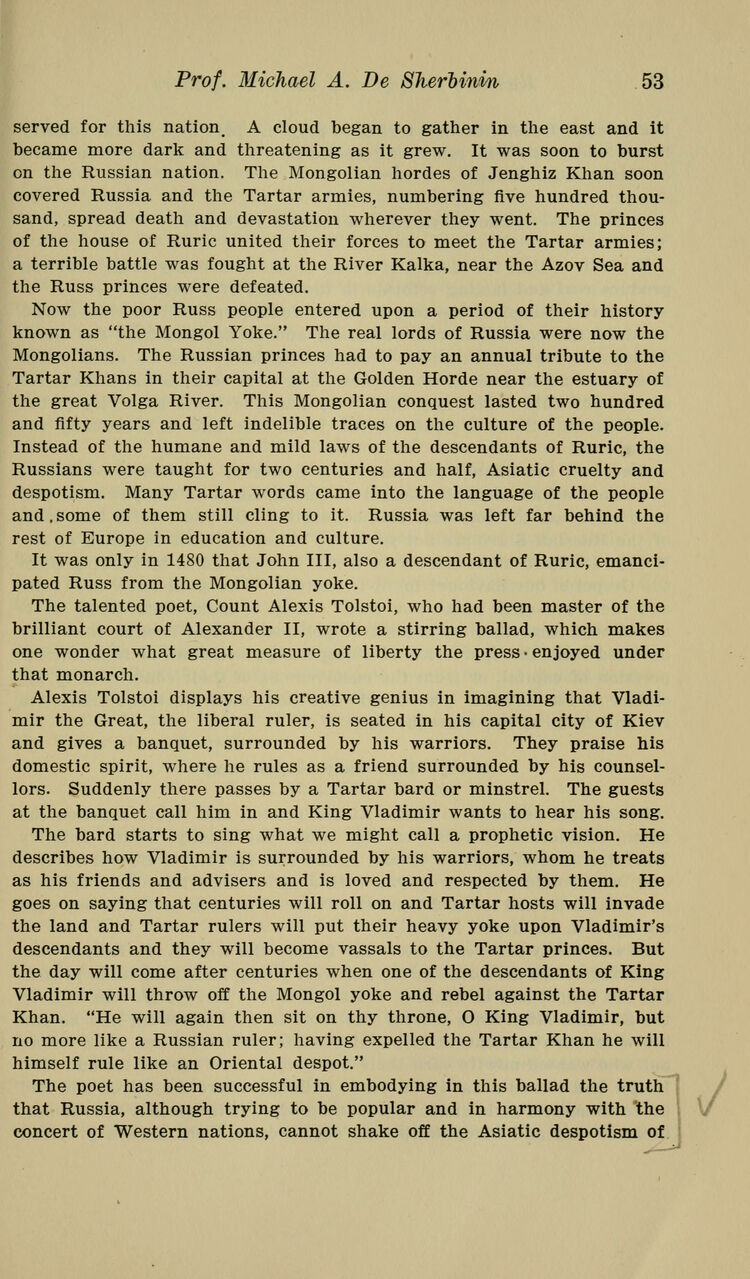
Full resolution (JPEG) - On this page / på denna sida - Russia’s People and Their Neighbors. Prof. Michael A. de Sherbinin - The Mongolian Invasion

<< prev. page << föreg. sida << >> nästa sida >> next page >>
Below is the raw OCR text
from the above scanned image.
Do you see an error? Proofread the page now!
Här nedan syns maskintolkade texten från faksimilbilden ovan.
Ser du något fel? Korrekturläs sidan nu!
This page has never been proofread. / Denna sida har aldrig korrekturlästs.
Prof. Michael A. Be SherUnm .53
served for this nation^ A cloud began to gather in the east and it
became more dark and threatening as it grew. It was soon to burst
on the Russian nation. The Mongolian hordes of Jenghiz Khan soon
covered Russia and the Tartar armies, numbering five hundred thou-
sand, spread death and devastation wherever they went. The princes
of the house of Ruric united their forces to meet the Tartar armies;
a terrible battle was fought at the River Kalka, near the Azov Sea and
the Russ princes were defeated.
Now the poor Russ people entered upon a period of their history-
known as "the Mongol Yoke." The real lords of Russia were now the
Mongolians. The Russian princes had to pay an annual tribute to the
Tartar Khans in their capital at the Golden Horde near the estuary of
the great Volga River. This Mongolian conquest lasted two hundred
and fifty years and left indelible traces on the culture of the people.
Instead of the humane and mild laws of the descendants of Ruric, the
Russians were taught for two centuries and half, Asiatic cruelty and
despotism. Many Tartar words came into the language of the people
and . some of them still cling to it. Russia was left far behind the
rest of Europe in education and culture.
It was only in 1480 that John III, also a descendant of Ruric, emanci-
pated Russ from the Mongolian yoke.
The talented poet, Count Alexis Tolstoi, who had been master of the
brilliant court of Alexander II, wrote a stirring ballad, which makes
one wonder what great measure of liberty the press • enjoyed under
that monarch.
Alexis Tolstoi displays his creative genius in imagining that Vladi-
mir the Great, the liberal ruler, is seated in his capital city of Kiev
and gives a banquet, surrounded by his warriors. They praise his
domestic spirit, where he rules as a friend surrounded by his counsel-
lors. Suddenly there passes by a Tartar bard or minstrel. The guests
at the banquet call him in and King Vladimir wants to hear his song.
The bard starts to sing what we might call a prophetic vision. He
describes how Vladimir is surrounded by his warriors, whom he treats
as his friends and advisers and is loved and respected by them. He
goes on saying that centuries will roll on and Tartar hosts will invade
the land and Tartar rulers will put their heavy yoke upon Vladimir’s
descendants and they will become vassals to the Tartar princes. But
the day will come after centuries when one of the descendants of King
Vladimir will throw off the Mongol yoke and rebel against the Tartar
Khan. "He will again then sit on thy throne, O King Vladimir, but
no more like a Russian ruler; having expelled the Tartar Khan he will
himself rule like an Oriental despot."
The poet has been successful in embodying in this ballad the truth
that Russia, although trying to be popular and in harmony with the
concert of Western nations, cannot shake off the Asiatic despotism
he i y
<< prev. page << föreg. sida << >> nästa sida >> next page >>